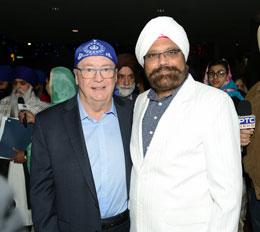Vaisakhi 2020 “is in your hands”

By Mata Press Service
Sikh entrepreneur Habinder Singh Sewak has always been in the forefront of Vaisakhi celebrations in British Columbia.
This year its no different, despite the cancellation of the mammoth Vaisakhi parades in Surrey and Vancouver, due to the COVID-19 health crisis.
Sewak has pivoted operations at his specialty candle and soap making operation – AlooAtta.com – to manufacture hand sanitizers.
Together with the B.C. Dairy Association, these hand sanitizers will be distributed at Sikh temples, community centres and facilities catering to seniors over the next few weeks in conjunction with Vaisakhi.
"BC Dairy planned to participate in this year's Vaisakhi event. When we learned of its cancellation, we asked Harbinder how we could assist the community during the COVID-19 pandemic. Together with AlooAtta, we are assisting the manufacturing of hand sanitizer and soap to help keep families safe," said Holger Schwichtenberg, chairperson of the B.C. Dairy Association.
"Dairy farmers value family and community. We are pleased to give back in a time of unprecedented need," said Holger, whose organization represents about 500 dairy farms – most of which are family-owned and operated - across B.C.
Every April, hundreds of thousands of Sikhs congregate in Vancouver and Surrey to celebrate Vaisakhi, one of the most significant days in the Sikh calendar, which marks the creation of the Khalsa or the Sikh faith.
The Surrey Vaisakhi parade draws more than 500,000 people in a massive show of diversity and inclusion and is considered the largest such event outside of India.
Gurdwara Sahib Dasmesh Darbar, organizers of the Surrey event, which was scheduled for April 25, said they made the “difficult decision” to cancel the event after consultations with health authorities.
For Sewak, this obstacle was an opportunity to give back to the community.
“We decided to pivot our operations at AlooAtta during this health crisis to provide hand sanitizers and soap to help control the spread of the virus in community settings,” said Sewak, who is also the founding publisher of the Post Group of Newspapers in Vancouver.
“There is a lot of emotional, religious and cultural attachment to this event and it provides for a good platform to reinforce the message that the fight against COVID-19 is in our hands.”
Sewak said the plan is to install dispensers at temples and distribute hand-held sanitizer spray bottles at smaller gatherings that abide by the current health policies.
“We will get close enough to send the message but stay far enough to maintain social distancing rules at this time,” he said.
Sewak said he was delighted with the B.C. Dairy Association which stepped up immediately on hearing about the initiative. Together AlooAtta and the B.C. Dairy Association are spending about $100,000 on the Vaisakhi “It’s in your hands” campaign.
“We are now increasing our capacity as other organizations, companies and individuals want to help provide hand sanitizers in these unprecedented times,” he said.
Sewak’s “Its in Your Hands” campaign comes in the wake of another AlooAtta community initiative last November to honour of the 550th birth anniversary of Guru Nanak, the founder of Sikhism.
AlloAtta made a record-breaking giant candle that stayed lit for over 550 hours at Gurdwara Dukh Nivaran Sahib in Surrey.
As Vaisakhi Day draws near, Sikh temples are advising their volunteers and congregations to be extra vigilant during the festival, which has always been about coming together to celebrate shared values.
Temple committees have enacted special rules about serving food at communal kitchens and hand hygiene and a schedule for volunteers to disinfect all surfaces–including the main prayer hall, kitchen, langar (communal dining) hall, and bathrooms– before and after every religious gathering.
The cancellation of the Surrey Vaisakhi Parade also referred to as the Khalsa Day Parade is expected to adversely impact the city’s economy.
Sewak, who commissioned an economic study based on the 2014 Surrey Vaisaskhi Parade said the event generates between $30 to $40 million in spending by visitors from out of town.
The 2014 parade was estimated to have contributed between $6.6 million and $12.3 million in GDP for the provincial economy, supported between 116 and 215 Full-Time Equivalent jobs, and contributed between $2.3 million and $4.4 million in tax revenues for federal, provincial and municipal governments.
Based on the estimates of the parade, between $2.6 million to $4.5 million worth of food and beverages were served; The average length of stay was 7 days for visitors from the rest of BC, 15 days for visitors from the rest of Canada, 15 days for visitors from the US, and 30 days for other international visitors.
(If you are interested in helping make and distribute free hand sanitizers during the current health crisis please email contact@alooatta.com or visit the website at alooatta.com)
The origins of Vaisakhi
Vaisakhi originated as a harvest festival in India's Punjab region hundreds of years ago.
In 1699, it took on special significance for Sikhs when Guru Gobind Singh — the tenth Sikh guru — created the order of the Khalsa.
Sikhs believe that on April 14, 1699, Guru Gobind Singh called all Sikhs to the Indian city of Anandpur Sahib, Punjab.
At the gathering, he asked all those in attendance to uphold their faith and preserve the religion.
The Guru is then said to have lifted his sword and asked the crowd who was prepared to die for their faith. Five men stepped forward.
Guru Gobind Singh called the five men the 'Panj Pyare', which means the Five Beloved Ones.
Vaisakhi or Khalsa Day parades are led by five men in ceremonial dress - to represent the Panj Pyare - the five beloved ones. To this day the five men are known as the first members of the Khalsa.









